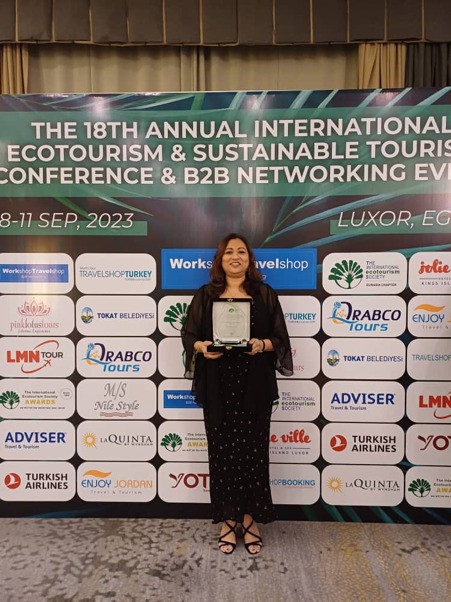CEMACS ACADEMIC WINS GLOBAL AWARD FOR DUGONG AND SEAGRASS CONSERVATION PROJECT
PENANG, 1 October 2023 – Dr. Leela Rajamani, a lecturer from the Centre for Marine and Coastal Studies (CEMACS) at Universiti Sains Malaysia (USM) has recently been honoured with the award for the Best Ecological Social Responsibility Project.

This accolade was presented by The International Ecotourism Society (TIES), the largest and oldest ecotourism society in the world, during the 18th Annual International Ecotourism & Sustainable Tourism Conference and the 3rd TIES awards ceremony held in Luxor, Egypt.
Leela’s project was part of the Global Environmental Facility (GEF) Dugong and Seagrass conservation initiative in Malaysia (MY3), supported by international funding from GEF with a total of RM 237,652.10.
The project entitled ‘Community Understanding and Management of Dugong and Seagrass Resources in Johor, Malaysia’ was selected from more than 15 nominations for this award.
Collaborators on this project included Associate Professor Dr. Nurul Farhana Low Abdullah from the USM School of Humanities and USM CEMACS Senior Science Officer, Sim Yee Kwang.
In addition, this grant received the prestigious USM Sanggar Sanjung award in 2018 in the category of 'International grants.'
The project's primary objective was to empower local communities with an enhanced comprehension of the ecological and economic significance of preserving dugong and seagrass resources.
It also aimed to bolster local capabilities in managing these resources more effectively, aligning with social, cultural, and economic imperatives.
A comprehensive public education campaign was launched in Pulau Tinggi, Johor, employing a diverse range of mediums, including posters, educational materials, and the distribution of a dugong-centric storybook, whereby this campaign targeted all segments of the community, from school children to housewives and fishermen.
Furthermore, the initiative sought to educate key stakeholders, such as resort boat operators and fishermen, on best practices associated with dugong and seagrass management.
This encompassed areas like boating activities and safe speeds; immediate response protocols for live, stranded or incidentally caught dugongs; seagrass habitat protection; and responsible waste management.
The project also introduced a dugong monitoring programme for local residents, conducted biannually to foster interest in dugong conservation, record reported sightings, and create a digital map of incidents shared with the community.
Expanding on these efforts, the project solicited community input regarding the optimal form of conservation management required.
This involved conducting a pre-test administered by the community itself, followed by the refinement, approval, and implementation of a tailored management initiative.
Detailed records of activities for each project are accessible through a dedicated Facebook page (https://www.facebook.com/dugongMY3) and the project's official website (https://www.dugongconservation.org/project/community-understanding-management-dugong-seagrass-resources-johor-malaysia-my3/).
The team's endeavours were also featured in local press reports, such as in Sinarplus article dated 16 October 2017, titled "Kumpul 1.7 Tan Sampah di Pantai Pulau Sibu."
The major impact of the project towards ensuring sustainability included:
1. Working with local communities and 8 resorts on the two islands namely Pulau Sibu and Pulau Tinggi to encourage the adoption of dugong and seagrass safeguards;
2. Building the capacity of local inhabitants to identify key seagrass areas, monitor their use, and inform marine park officials of illegal activities;
3. Gathering public support (at least 60% of the targeted inhabitants) for the introduction of management measures at a local level that would prevent physical damage to seagrass and loss of dugongs, including reduction of boat speeds in seagrass areas, responding to strandings/incidental entangling, encouraging better waste management and dugong/seagrass-friendly tourism practices.
It can thus be seen that the objectives and activities of this project align seamlessly with CEMACS's primary aim of enhancing the capability to conduct comprehensive interdisciplinary studies.
These efforts are dedicated to resolving challenges related to marine and coastal ecosystems, specifically in conserving biodiversity and marine habitats like seagrass, both locally and globally.
This mission dovetails with the United Nations (UN) Sustainable Development Goal (SDG) 14 – Life Under Water.
Therefore, it is anticipated that the recognition garnered from this award will significantly contribute to USM's documentation for its SDG Sustainability Report.
Text: Dr. Leela Rajamani, Assoc. Prof. Dr. Nurul Farhana Low Abdullah & Sim Yee Kwang
- Created on .
- Hits: 2472
